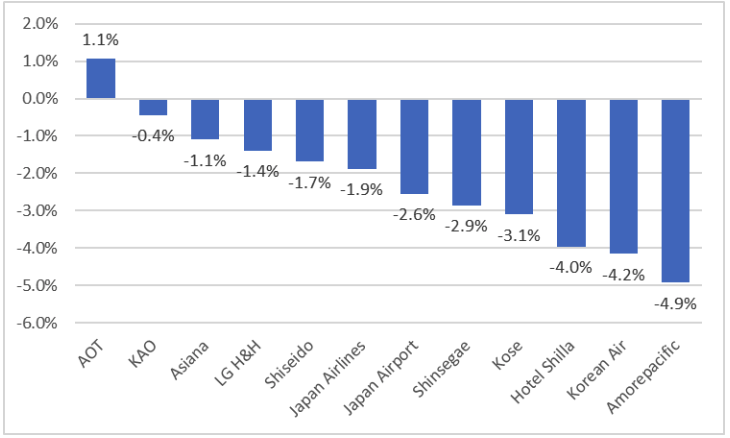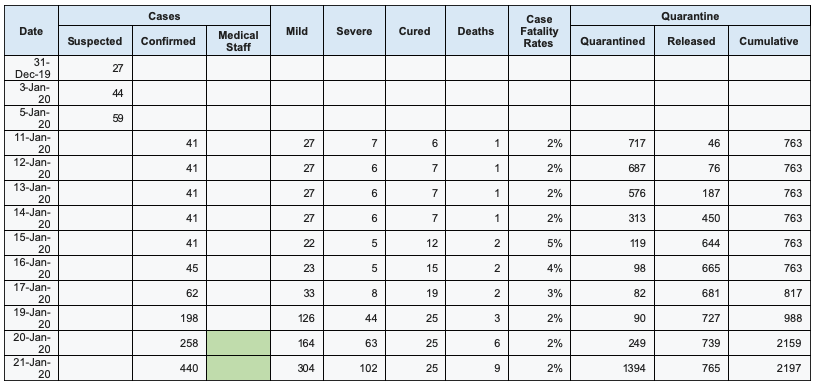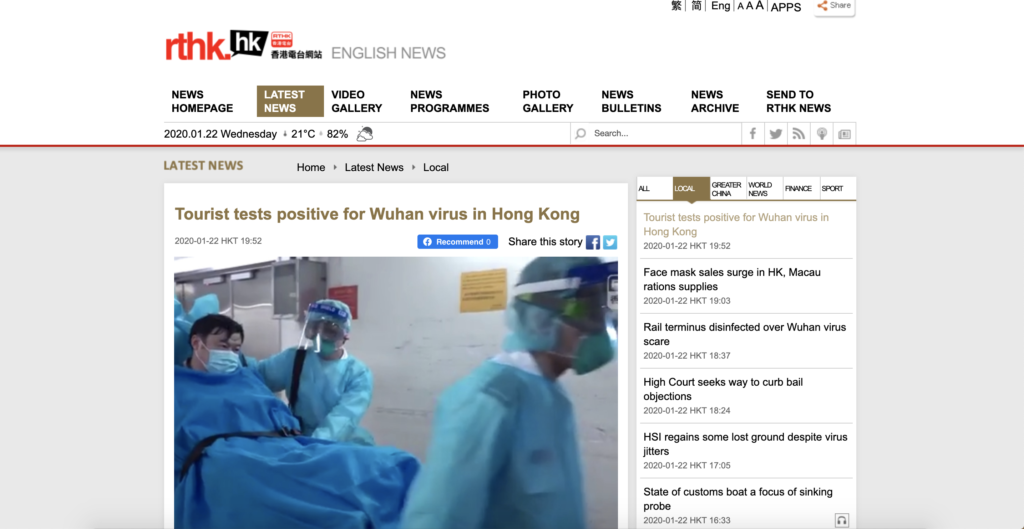Health
Coronavirus Update: Chinese death toll rises to 26; Thailand hit hard by Wuhan lockdown – m1nd-set – The Moodie Davitt Report – The Moodie Davitt Report

| Publisher’s Note: Given the serious implications of the coronavirus outbreak for the aviation, tourism and travel retail sectors, The Moodie Davitt Report is updating this page throughout each day with the latest news from around the world.
Although the Chinese authorities are tackling the issue with a welcome vigour and transparency, there is no doubt that the outbreak of 2019 Novel Coronavirus (2019-nCoV) offers clear and present danger for all travel-related business sectors, aviation and travel retail being high on that list. Our tone is objective and factual, not sensationalist nor scare-mongering. We will bring you the latest information on cases, deaths and countries affected. We will bring you news of how the travel sector is being affected and how it is responding. We will examine investment community sentiment and see how key travel retail-related stocks are being impacted. All this at a time that normally represents an exuberant global celebration of the Lunar New Year, one that coincides with an extraordinary number of travel journeys both within and from China – the epicentre of travel retail 2020-style. Those of us who worked in this industry during the SARS crisis of 2003 know only too well what impact a major health crisis can have on travel markets, performance and stocks. We very much hope that a repeat is not on the cards but we will certainly ensure that the travel retail channel is kept up to date each and every day on developments. |
JANUARY 24
EUROPE. The European Tourism Association today issued its own statement on the outbreak, highlighting its concerns but also saying that the threat – so far – has not become reality in the European travel market.
“While there is much that is unknown about this new virus,” said CEO Tom Jenkins, “we do know that the factors that led to the rapid spread of SARS are not being repeated. The Chinese authorities have been prompt in highlighting the problem, and are supplying daily updates on the situation. President Xi Jinping called upon all officials to tackle the issue as a national crisis. The Chinese may be far more mobile than they were in 2002, but the country is far better prepared and determined that the virus will be contained. Draconian measures are being put in place to halt any spread, including the banning of all outbound public transport from Wuhan.
“SARS was spread by people not knowing about the infection and, consequently, unaware that they were travelling from an infected area. This is not the case in 2020.”
He added: “In Europe, precautions are in place. Airports are installing monitoring. Major public information campaigns are being initiated. All health officials are on alert. The virus is of major international concern, but it remains a remote threat for any traveller in Europe.”
CHINA (HONG KONG). Hong Kong has today reported two more cases of patients testing positive, potentially doubling the number of cases to four. Suspected cases in the Special Administrative Region rose to 236 by Friday morning according to the South China Morning Post.
CHINA. Beijing and Shanghai today raised their public health emergency levels to the highest possible status in light of the coronavirus threat. They join Hubei, Hunan, Zhejiang, Anhui and Guangdong provinces [Source: Global Times]
CHINA. The number of deaths has increased to 26, with the number of confirmed cases across China rising to over 900, Global Times is reporting. The latest fatality is in Heilongjiang Province, making it the second death outside of Hubei Province.
Importantly too, 34 diagnosed patients had been cured and released from hospital. Four new infections have been confirmed in Beijing, bringing the tally to 26 in the Chinese capital. Tibet Autonomous Region and Qinghai Province are the only two Chinese regions to have not reported any cases. [Source: Global Times].
CHINA. As revealed yesterday, the famed Palace Museum in Beijing has been closed from tomorrow (the first day of the Lunar New Year) until further notice in order to avoid cross-infection. The Palace Museum is one of China’s most popular tourist attractions.
INTERNATIONAL. Swiss travel retail research agency m1nd-set states that Thailand will be the most-affected destination market, by quite a long margin, in terms of curtailed flights into and out of Wuhan. The agency has drawn on data from its Business 1ntelligence Service (B1S), which sources actual and forecast traffic information from IATA’s comprehensive traffic database [see below chart for more details and click to enlarge].
In a timely study on the destinations likely to be most affected by the cessation of flights to and from Wuhan (based on the past 12 months of traffic data and taking only international flights into account), m1nd-set noted that Thailand is the final destination for 33% of passengers that fly internationally from Wuhan Tianhe International Airport.
Japan follows with 12% while Malaysia accounts for 10% of final destination international traffic from the Chinese city, Singapore 9%, Hong Kong 8% and Indonesia 7%. Taiwan and South Korea both account for 6% of international traffic from Wuhan.
In terms of city destinations, the top final international destination for Wuhan origin traffic is Bangkok, where both international airports (Suvarnabhumi and Don Mueang) collectively account for 21% of international traffic from Wuhan. Singapore follows with 9% then Hong Kong with 7%, Narita and Seoul both with 6%, and Denpasar and Phuket each with around 5% of Wuhan origin traffic. China Southern Airlines is the leading airline operating from Wuhan, accounting for 34% of outbound international traffic, followed by Thai AirAsia with 12%. Cathay Dragon, which yesterday announced it was temporarily suspending all flights to and from Wuhan, accounts for 7%.
With Chinese travellers being among the top nationalities for duty free shopping when travelling internationally, spend at the destination airports will inevitably be affected, m1nd-set noted. Over 50% of Chinese shop at airports, which is more than double the global average, it said.
Beauty will be the most-affected category, as it accounts for 60% of the collective Chinese spend when travelling. Alcohol and fashion & accessories are the next most popular categories.
M1nd-set Owner & CEO Peter Mohn said, “A number of clients have expressed deep concern and want to understand the overall impact the virus will have on the business. Our traffic analysis tool enables us to identify all affected destinations, not only the direct destinations but also the final destinations as many passengers from Wuhan transit at a regional hub airport to reach their final destination.
“We can see that of the 56 airlines which operate out of Wuhan, they serve 450 direct destinations and 1055 final destinations. The impact of the coronavirus will inevitably be felt well beyond Wuhan’s direct connection airports.”
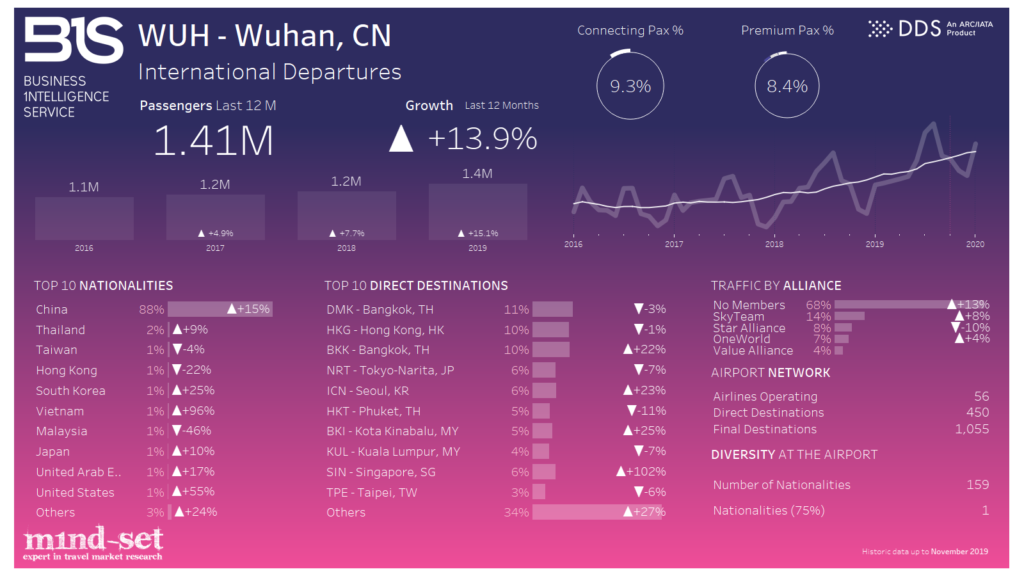

The top direct destinations for passengers taking international flights from Wuhan. This differs slightly from the other graphic, which accounts for the final destination of passengers travelling internationally from Wuhan
Contact: info@m1nd-set.com; www.m1nd-set.com
JAPAN. A second case of the coronavirus (full name 2019 Novel Coronavirus (2019-nCoV) was confirmed today. The 40-year-old male patient has been living in Wuhan and recently visited Tokyo.
UK. 14 people have so far been tested for the virus, BBC reported, citing government body Public Health England statistics. Five have tested negative and nine are awaiting results. The report said that a further six individuals are being tested in hospitals in Scotland and Northern Ireland after displaying symptoms.
All those tested had been in Wuhan – the Chinese city where the new strain of the virus emerged.
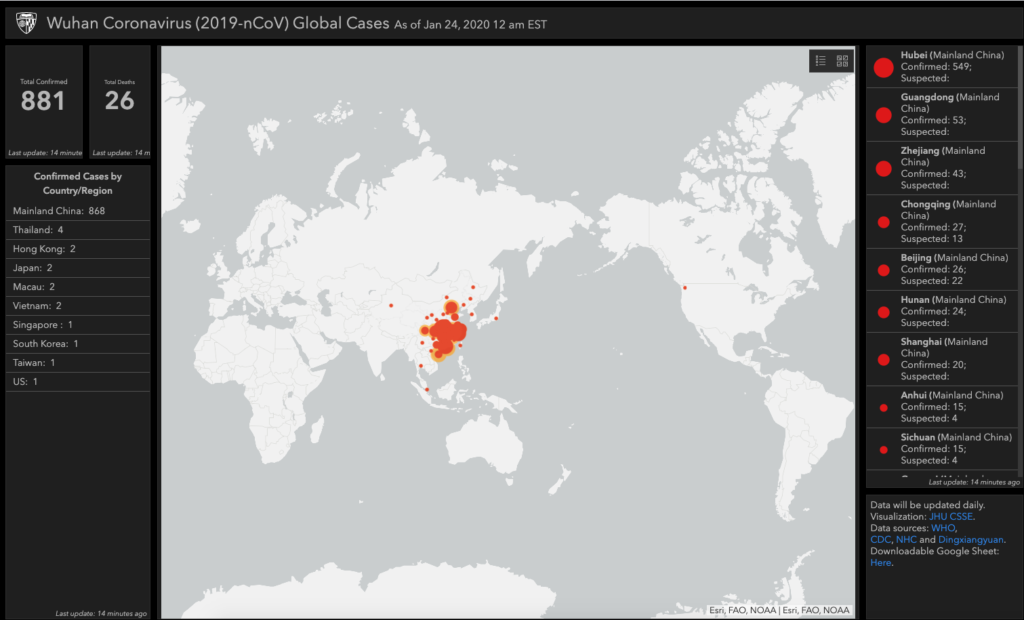

The scale of the outbreak at midnight (EST) at the beginning of 24 January, according to John Hopkins University (click to enlarge)
23 JANUARY
CHINA. Global Times reports there has been the first death outside of Hubei Province, bringing the confirmed number of fatalities from the coronavirus to 18. The 80-year-old, who had lived in Wuhan for two months, died in Cangzhou in Hebei Province.
Meanwhile, a further city in Hubei has shut its train stations. Ezhou, which has a population of more than 1 million, has become the third city to take the action.
INTERNATIONAL. After what was billed by WHO Director-General Tedros Adhanom as “a very complex deliberation”, the Emergency Committee convened by the organisation has chosen not to declare the outbreak an emergency of international concern.
Didier Houssin, who chaired the Emergency Committee, said the decision had been taken “because of [the] limited number of cases abroad and the efforts which are presently being made [by] Chinese authorities in order to try and contain the disease”.
Adding a note of caution, Adhanom said: “This is an emergency in China, but it has not yet become a global health emergency. It may yet become one.”
The WHO added that it does not recommend any broader restrictions on travel or trade, but that it does advise exit screening at airports as part of a comprehensive set of containment measures.
The Emergency Committee on the new #coronavirus (2019-nCoV) considered that it is still too early to declare a public health emergency of international concern given its restrictive and binary nature
— World Health Organization (WHO) (@WHO) January 23, 2020
VIETNAM. Two male Chinese patients have tested positive for the coronavirus at Cho Ray Hospital in Ho Chi Minh, the Vietnamese Ministry of Health has announced.
One of the Chinese men was infected by his father, who travelled to Vietnam from Wuhan on 13 January and also tested positive. Both have been quarantined and doctors say their fever has abated.
INTERNATIONAL. Drinks data and intelligence analyst IWSR has raised concerns over the outbreak’s possible impact on the travel retail liquor market – and offered a reminder of how the sector was hit by SARS in 2003.
IWSR noted: “The coronavirus recalls memories of the 2003 SARS epidemic that primarily hit Southeast Asia, and that was also caused by a coronavirus, killing approximately 800 people. Although these are relatively few deaths in a global context, the SARS virus did have a negative impact on international travel. Figures from International Air Transport Association show a -2.4% drop in international passenger traffic for 2003, with a -9% decline in Asia Pacific.
“Translating this to travel retail sales, IWSR figures show spirits volumes in the travel retail channel in Asia Pacific fell by -1.6% in 2003, picking up again by +5.9% in 2004 and +5.2% in 2005. Cognac and Scotch, key categories for the Asia Pacific travel retail market, suffered similar fates; Cognac volumes fell by -7.3% and Scotch fell by -1.5% in 2003. Both categories picked up considerably in 2004, with volumes increasing by +7.0% and +6.1% respectively.”
IWSR Director Alastair Smith said: “’Restrictions on travel during this Chinese New Year won’t have a big impact on the travel retail liquor sector. The real threat will be felt by international travel. Fear was a key motivator in decreased international travel during the SARS epidemic. What is difficult to judge right now is whether the coronavirus will be contained, in which case, the impact will likely be minimal. However, if consumer fear and uncertainty around the spread of the virus rises, we may be poised to see a repeat of something closer to the scale of 2003.”
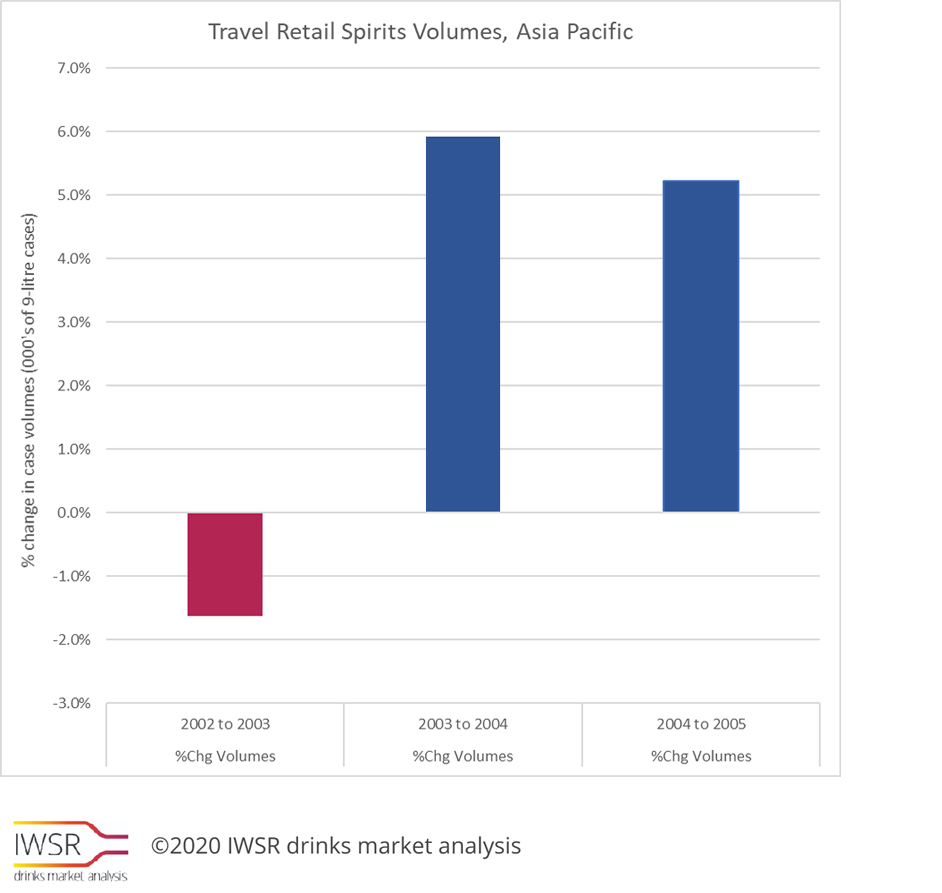

A snapshot of performance in travel retail liquor volumes in 2003 amid the SARS crisis, with a strong recovery in the two years that followed (Source: IWSR)
SINGAPORE. The Ministry of Health has confirmed the first case of the coronavirus in Singapore. A 66-year-old Chinese national from Wuhan, who arrived with his family on 20 January, has tested positive. He is currently in an isolation room at Singapore General Hospital and his condition is stable.
In its latest update, the Ministry of Health added: “Singapore will expand our travel advisory to recommend that Singaporeans avoid travel to the whole of Hubei Province, in view of the travel restrictions that China has imposed on Huanggang and Ezhou. [The] Ministry of Health also advises Singaporeans to continue to exercise caution and attention to personal hygiene when travelling to the rest of China.”
CHINA. Some major cultural events that were set to take place over the Spring Festival in Beijing have been cancelled, Global Times reports. These include two big temple fairs that were due to run during the holiday period. One of the most popular visitor sites in the city, the Palace Museum (housed in the Forbidden City at the heart of Beijing) will close from 25 January, the state-owned media confirmed.


Other museums also announced plans to cancel certain activities to reduce the number of visitors during the period.
CHINA (HONG KONG). Cathay Dragon, the subsidiary of Cathay Pacific, is temporarily suspending flights to and from Wuhan from tomorrow (24 January) until the end of February.
“We are monitoring the situation closely and will continue to coordinate with the health authorities in Hong Kong and in all the ports to which we operate flights,” the airline said in a statement.
CHINA. Xinjiang has reported its first two cases of coronavirus infections. Both individuals had travelled to Wuhan, Global Times reports. Shaanxi Province in Northwest China has reported its first three confirmed cases.
CHINA. State media in China has announced that Huanggang, a city located 75 kilometres from Wuhan, will become the second city (after Wuhan) to suspend all public transport services.
Global Times reported that at midnight (local time) all subways, train stations and roads out of the urban area of Huanggang will be suspended.
Meanwhile, People’s Daily has updated the number of confirmed cases in China to 631, with new cases across multiple districts.
#LATEST on #WuhanPneumonia:
– 631 cases confirmed nationwide, 17 dead
-Jilin in NE China, Xinjiang, Ningxia in NW China confirmed their first cases
– 8 more in Beijing
– 7 more in Shanghai
– 8 more in Anhui
– 5 more in Hunan
– 17 more in Zhejiang
– 6 more in Guangdong pic.twitter.com/twthtgqmh3— People’s Daily, China (@PDChina) January 23, 2020
ASIA. Uncertainty prevailed in the Asian stock markets today, The Moodie Davitt Report Senior Retail and Commercial Analyst Min Yong Jung reports.
The Hang Seng Index slipped -1.7%, the Shanghai Stock Exchange Composite Index was down -1.5%, the KOSPI dropped -0.8% and the Nikkei 225 was down -1%.
Investors are risk-averse and, reacting to news of the coronavirus, companies dependent on China and tourism saw higher outflows. Among the share price of companies we monitored, Amorepacific (down -4.9%) and Korean Air (down -4.2) suffered the worst losses.
However, most of the stocks are trading well above their 52-week low and companies reporting their earnings in the coming weeks will hope their results will be enough to attract bargain-hunting investors.
EUROPE. International payments provider Planet has warned about the impact on the luxury goods industry worldwide if the coronavirus strain continues to spread.
Planet noted: “The talk of potential travel restrictions comes at a time when luxury retailers would typically be expecting a windfall in sales to Chinese shoppers, with major national holiday Chinese New Year just days away. Luxury retailers in Europe are bracing themselves for potential hit to their sales.
“Earlier this week, major luxury brands Louis Vuitton, Gucci and Cartier have all experienced stock market declines ranging between -5% and -6%. Chinese consumers are these brands biggest customers, with a recent Bain & Company report predicting that China represents around 35% of the global income of the sector.”
According to Planet’s data, sales to Chinese shoppers in Europe grow by +6% compared with the previous year, with the average spend per purchase rising by +10%.
Referring to the UK market alone, Planet said that in 2019, the average Chinese spend on watches and jewellery rose by +19% to €2,854 on average.
Planet UK Country Manager David Perrotta expressed concern but sounded a balanced note. He said: “Chinese New Year is a time marked by travel and spend abroad. This is typically a major opportunity for retailers in Europe. Travel restrictions could have a significant impact on sales during this crucial two-week spending period. Of course, we need to wait and see whether the Chinese government will take steps to control the virus, so in the meantime we will all be holding tight. Not all is lost, as a big part of sales from Chinese shoppers comes towards the second half of the year during another national celebration, Golden Week, which could aid a recovery of the sector.”
CHINA. The situation has deteriorated considerably today. State-controlled media Global Times has been providing real-time updates on the crisis. Here are some of the key developments so far today:
-
- 17 more coronavirus cases confirmed in Zhejiang Province; 3 more reported in Fujian Province, 1 in Jilin Province
- Jiangsu Province in East China confirmed its first case
- A female railroad employee on a Wuhan-bound high speed train from Northeast China’s Liaoning Province infected
- First Hong Kong case confirmed this morning following two highly-suspected cases reported on Wednesday and Thursday
- A second case has been reported in Macau, a hotbed for travel retail. Local tourism authorities have cancelled all Spring Festival activities, Global Times reported
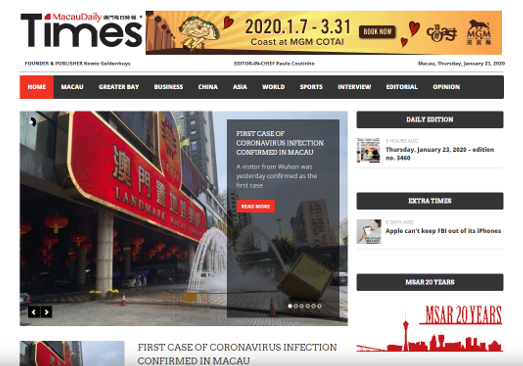

The Macau Daily Times website dedicates home page coverage to the coronavirus crisis
-
- According to The Macau Daily Times, the latest case involves a 52-year-old woman from Wuhan who arrived via the Border Gate, having travelled by train from Wuhan to Zhuhai first. An investigation revealed that she took a casino shuttle bus to the Landmark Macau and met with two friends before checking in. During her stay in Macau, besides dining out in restaurants near her hotel, she also gambled inside the property’s casino, the media reported.
- Seven new cases confirmed in Shanghai as of Wednesday midnight
- By 08.18 Beijing time, 571 coronavirus cases confirmed in China, with 17 deaths
- This was the scene at Wuhan Tianhe International Airport earlier today as passengers looked to catch flights before the airport suspended operations at 10am (local time)
Inside Wuhan airport, people are queueing for flight check-ins.
In the early morning, the local authorities announced to suspend the city’s public transportations from Jan 23 10am. #WuhanCoronavirus #WuhanPneumonia pic.twitter.com/KHUxR6cRIJ— Lea Li (@Lealokkk) January 22, 2020
22 JANUARY
CHINA. All outbound transport from Wuhan will be suspended from 10am (local time) on 23 January, according to The People’s Daily.
The publication, which is the official newspaper of the Committee of the Communist Party of China, is reporting that train stations and Wuhan Tianhe International Airport will shut down, as will buses, subways and ferries.
No people in #Wuhan, China’s Hubei will be allowed to leave the city starting 10 a.m. of Jan. 23. Train stations and airport will shut down; the city bus, subway, ferry and long-distance shuttle bus will also be temporarily closed: local authority #WuhanPneumonia #coronavirus pic.twitter.com/8pohJ4Uixo
— People’s Daily, China (@PDChina) January 22, 2020
INTERNATIONAL. The Emergency Committee convened by the World Health Organization (WHO) has said it will need more information to determine whether to declare a public health emergency of international concern.
“The decision about whether or not to declare a public health emergency of international concern is one I take extremely seriously, and one I am only prepared to make with appropriate consideration of all the evidence,” WHO Director General Tedros Adhanom said.
The Emergency Committee will meet again tomorrow (23 January) to continue their discussion and look at further evidence.
HONG KONG. The first “preliminary positive” case of the virus has been diagnosed in Hong Kong, confirming earlier news reports (see below). A 39-year-old man was quarantined after arriving from Wuhan to Hong Kong on Tuesday via high-speed rail from Shenzhen, and was detected with a fever at the border crossing. Health Minister Sophia Chan said he was in a stable condition in an isolation ward at Princess Margaret Hospital.
The government said it would be contacting and testing passengers who sat near him. They will also be observed in isolation wards, according to reports in Reuters, Bloomberg and the South China Morning Post, citing local officials.
Minister Chan did not confirm local media reports of a second person with similar test results, Bloomberg reports.
Also in Hong Kong, Cathay Pacific Airways has said crew members and front line employees are permitted to wear surgical masks on mainland China flights, after the flight attendants union raised concerns this week.
CHINA. The Hubei Provincial Health Commission has confirmed eight new deaths from the coronavirus, bringing the total number of fatalities to 17. The number of confirmed cases in Hubei (in which Wuhan is located) has also risen to 444, bringing the total across Mainland China to 509 and the total globally to 517.
INTERNATIONAL. The Moodie Davitt Report Senior Retail and Commercial Analyst Min Yong Jung has assembled data from the Wuhan Municipal Health Commission to give a timeline on the outbreak of the coronavirus.
Key data to watch for include infections among medical staff infections and case fatality rates. During the SARS crisis in 2003, cases among medical staff treating patients helped to spread the outbreak. To date, confirmed numbers of infections among hospital staff from this new coronavirus strain have not yet been released, but authorities say that some hospital workers have been infected.
Meanwhile, the case fatality rate for SARS was 9.6%; the fatality rate of this coronavirus is not nearly as severe currently, as the chart above underlines.
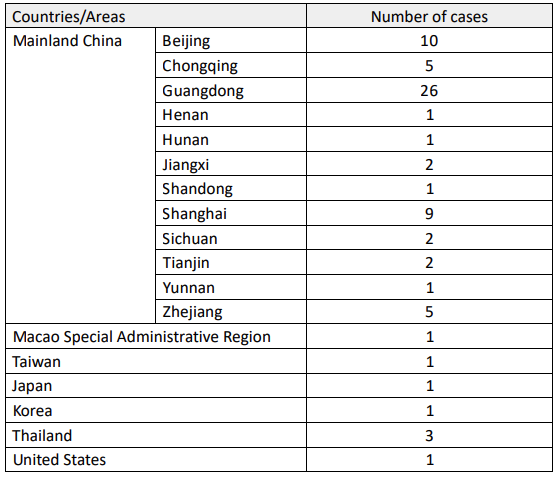

The most recent figures on confirmed cases outside of Hubei Province show the current global spread of the coronavirus
INTERNATIONAL. The World Health Organization (WHO) is today holding an emergency meeting to establish if the outbreak constitutes a public health emergency of international concern and what recommendations should be put in place, including possible travel restrictions.
“Based on currently available information, there is no justification for any restriction of travel or trade. Should this situation escalate, WHO may provide guidance on the risk of travel to affected areas,” a WHO spokesperson said.
The organisation added that more cases should be expected in other parts of China and possibly additional countries in the coming days.
The Emergency Committee on the new #coronavirus (2019-nCoV) meets today to ascertain whether the outbreak constitutes a public health emergency of international concern, and what recommendations should be made to manage it https://t.co/Qtsxqkr7xi pic.twitter.com/aC8NYUkS9h
— World Health Organization (WHO) (@WHO) January 22, 2020
CHINA (HONG KONG). Local broadcasters in Hong Kong (RTHK, Cable TV and TVB) are reporting a first case of the coronavirus in the territory. The patient took the high-speed rail line from Wuhan to Shenzhen and then to Hong Kong, according to the reports.
INTERNATIONAL. Our Senior Retail and Commercial Analyst Min Yong Jung has looked at the impact of the outbreak on the global stock market. While yesterday was a tough day for benchmark stocks in the US and Asia, Asian markets did recover during trading today. Read his full analysis here.
CHINA (MACAU). Macau officials today confirmed the first case of the new coronavirus strain: a 52-year-old businesswoman from Wuhan who arrived on Sunday and checked into hospital on Tuesday, officials said. Details were provided by Macau Secretary for Social Affairs and Culture Ao Leong Lu, who heads a task force set up to respond to the virus threat.
Casinos and hotels have tightened temperature screening measures around the city and according to media reports locally, all casino staff and civil servants have been ordered to wear face masks.
Macau is a popular Lunar New Year destination for many Mainland Chinese.
CHINA. Chinese National Health Commission officials said today that the coronavirus could mutate with a risk of the epidemic spreading to other regions. The news was reported by state-owned Global Times, which added that 440 cases of infection have been confirmed and nine deaths reported.
In a press conference in Beijing today, National Health Commission Vice Head Li Bin said that confirmed cases are mostly confined to Wuhan (although there are a limited number of cases elsewhere in China and overseas).


How Global Times reported the news today of the virus spread and the risk of further mutation
The sudden rise in confirmed cases, said Li, is due to improved and effective diagnosis. Overall, Li said, 2,197 people who were in close contact with infected patients have been tracked; among them 1,394 are being observed by medical teams.
To prevent the virus strain from spreading, the local government has urged people not to travel to the city and discouraged Wuhan residents from travelling outside. The report said that reducing the flow of people should decrease the chances of the virus spreading.
In Wuhan, body temperature screening devices have been deployed in the airport, train stations and long-distance bus stations to monitor people as they leave, Global Times reported.
The source of the new coronavirus has yet to be confirmed and the transmission route of the virus is yet to be fully understood, according to officials. But the Chinese government is confident of winning this fight, Li said.
GERMANY. German airports association ADV has issued a statement on the coronavirus outbreak, saying that its members are giving the unfolding situation their “highest attention”. The ADV stressed that the WHO had not issued any guidelines about travel restrictions, though it is in close contact with the relevant authorities.
Five major German airports – Hamburg, Düsseldorf, Frankfurt, Munich und Berlin – have emergency plans and capacity in place. Any flight with a suspected case arriving in Germany will be diverted to one of these locations. ADV said it was confident that the processes that have been established for many years at airports to cope with an infection outbreak would robustly protect public health.
CHINA. OAG, which provides digital flight information, intelligence and analytics for airports, airlines and travel tech companies, has assessed the possible impact on air travel to and from Wuhan. As reported, some airports have introduced screening for flight arrivals from the city.
OAG schedules data for Q1 2020 show that nearly 90% of flights go to other cities in China. The largest international markets are Thailand with nearly 107,000 seats, Japan with 67,000 seats and Singapore with 42,000 seats. (The table shows Q1 2019 bookings by key destination, which OAG says represents a proxy for likely travel patterns this year).
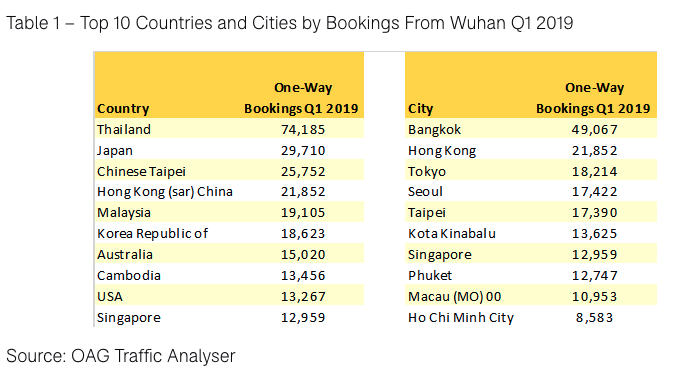

The leading destinations from Wuhan by country and city in this period last year (click to enlarge)
Many travellers from China’s regions connect through the country’s international hubs to travel overseas. From Wuhan, Guangzhou is the key gateway to other destinations, says OAG, followed by Shanghai Pudong, Beijing Capital, Hong Kong International and Kunming (based on Q1 2019 seat figures).
21 JANUARY
US. The country has revealed its first confirmed diagnosis of the coronavirus strain, the US Centers for Disease Control and Prevention announced today.


How CNN reported the first diagnosed US case of the new coronavirus strain
According to CNN, the male patient is in isolation at Providence Regional Medical Center in Everett, Washington. The resident of Snohomish County in Washington travelled from Wuhan to Washington. CNN said that the officials are compiling a list of people the patient may have had contact with since his return to the US.
CHINA. President Xi Jinping has ordered “resolute” efforts to curb the spread of the new strain of coronavirus that has led to a mounting number of pneumonia cases and four deaths.
State-owned media Global Times reported the leader’s call today, noting that as of 6 p.m Monday, 224 cases of pneumonia caused by the coronavirus strain had been reported in China. Of those, 217 had been confirmed and seven remained suspected.
Overseas, the report said, one case has been confirmed in Japan, two in Thailand, and one in the Republic of Korea.
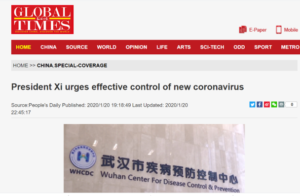

In a reflection of much greater transparency than during the SARS outbreak of 2003, Chinese state media titles are dedicating widespread coverage to the latest crisis


In a separate report, Global Times said that Wuhan has established headquarters for the control and treatment of the pneumonia. A meeting on Monday of involved groups requested a range of protective measures, including body temperature checks at airports, railway stations and ports.
Wuhan is enforcing strict entry and exit health controls ahead of the peak travel season later this week as the Chinese New Year holidays begin.
Airports and medical authorites overseas are introducing protective measures. The Ministry of Health in Singapore is expanding temperature screening at Changi Airport and issuing Health Advisory Notices for all inbound travellers on flights arriving from China from tomorrow, 22 January


Wuhan, capital of Hubei province, is the epicentre of the outbreak (Image: Centers for Disease Control and Prevention)
The outbreak has spurred unwelcome memories of the SARS crisis of 2003 which resulted in 8,098 cases and 774 deaths across 37 countries and had severe repercussions for the global travel retail industry.
Traffic slumped at airports across the world, with passenger volumes at key locations such as Singapore Changi and Hong Kong International down by -50% to -70% during the worst of the crisis in April and May of that year.
However, Zhong Nanshan, the head of the National Health Commission of the People’s Republic of China told reporters that there was no danger of a repeat of the SARS epidemic as long as suitable precautions are taken. The travel retail industry worldwide will be hoping he is right.
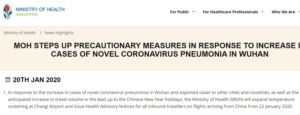

The Ministry of Health in Singapore is expanding temperature screening at Changi Airport and issuing Health Advisory Notices for all inbound travellers on flights arriving from China from tomorrow, 22 January


Health
New technology to advance women’s cancer care at Southlake
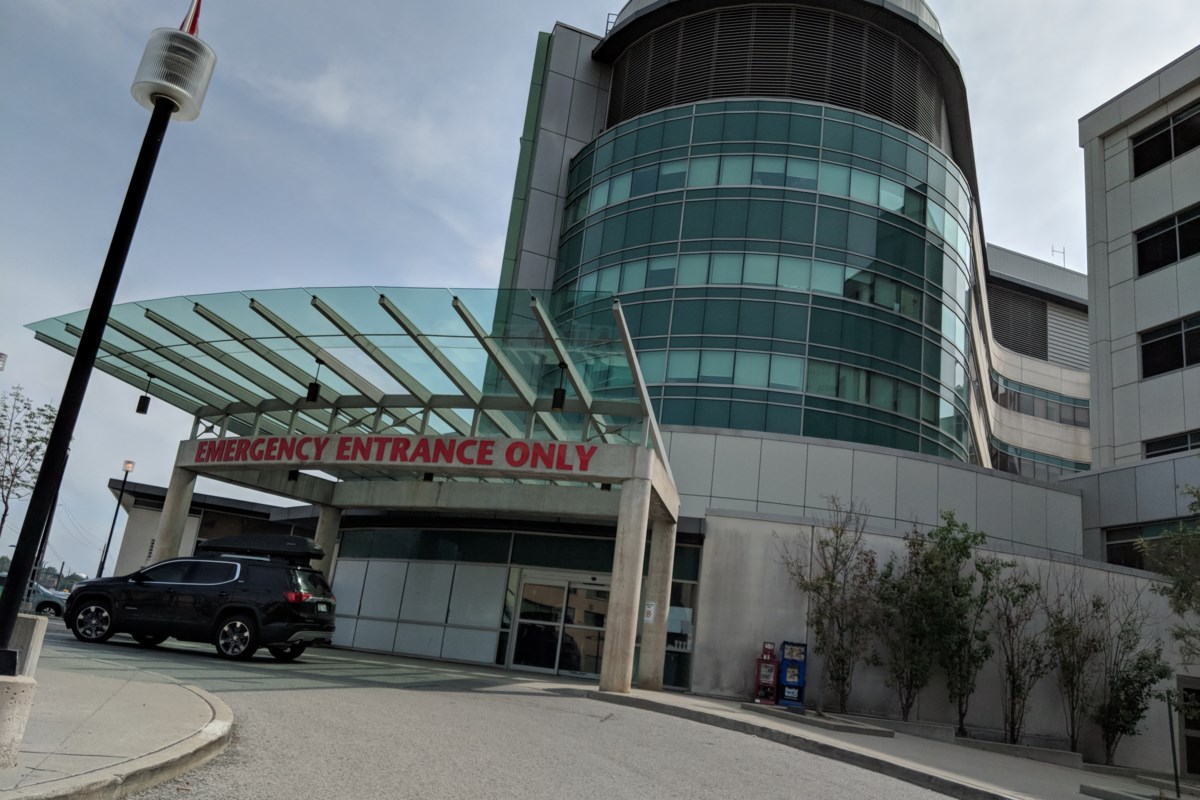

|
|
NEWS RELEASE
SOUTHLAKE REGIONAL HEALTH CENTRE
**************************
This Cancer Awareness Month, Southlake is adding advanced technologies to detect and treat breast cancer and other women’s cancers thanks to generous community donor support, most recently through the HERE is Where Cancer Meets its Match campaign. New cancer care technology, including new mammography machines, the MyoSure System and the MOLLI 2® System will make a measurable impact in diagnosing and treating women’s cancers in the communities Southlake serves.
Southlake is installing three new mammography machines to expand its breast cancer screening program to 1,500 more women each year. Two of these machines have new biopsy capabilities that will reduce the number of cancelled exams due to equipment failure, ensuring timely care for women. Women ages 40 to 49 years old will be able to self-refer for publicly funded mammograms through the Ontario Breast Screening Program starting this fall.
“Early detection is critical when treating breast cancer and other women’s cancers,” said Lorrie Reynolds, Director, Regional Cancer Program at Southlake. “We treat more than 1,700 breast cancer patients at Southlake every year. By adding advanced technology, like the new mammography machines, we’re ensuring women have the best experience at Southlake.”
Southlake is also introducing the MyoSure System, an innovative technology that can help detect female reproductive cancers. Damaged tissue in a woman’s uterus such as fibroids and polyps can now be removed in a precise, minimally invasive procedure that leaves the rest of the uterus intact. This will improve the overall patient experience by supporting faster recovery, reducing the risk of infection and giving more women the option to have children. An estimated 200 women per year will benefit from the MyoSure System.
The new mammography machines and the MyoSure System build on Southlake’s recent investment in the MOLLI 2® System, a made-in-Canada wire-free breast localization technology. This technology is considerably less invasive and more accurate when compared to wire-guided localization, resulting in a better patient experience and improved cosmetic outcomes. More than 200 women each year will benefit from this innovative medical device as they are treated for breast cancer at Southlake.
“As a clinician caring for women with cancer in our community, I’m incredibly proud of the work Southlake is doing to advance women’s health and improve patient experiences,” said Sara Temple, MD, Surgical Oncologist and Chief of Surgery at Southlake. “Women who visit Southlake can be confident that they are receiving leading edge care, close to home when they need it most.”
The World Health Organization anticipates a 77 per cent increase in cancer diagnoses by 2050. Southlake serves some of the fastest growing communities in Canada and anticipates that the number of patients requiring cancer care will grow. By investing in new technology, Southlake is ensuring that women in the communities it serves have access to leading edge cancer care. All of these investments were funded with support from community donors who generously gave to Southlake to support investments into women’s health at the hospital.
“The generosity of our donor community and the impact they have made for women receiving cancer diagnosis and treatment at Southlake is something we can all take great pride in,” said Jennifer Ritter, President and CEO of Southlake Foundation. “From our Women’s Health Initiative donors supporting new mammography machines, to the Ladies in Philanthropy for Southlake funding the MOLLI 2 System, to our long-standing partners The Edge Benefits and Pheasant Run Golf Club enabling the introduction of MyoSure System through their joint annual charity golf tournament, we are incredibly lucky to share a vision of access to exceptional care for everyone who depends on Southlake when they need us most. Thank you, to every donor who contributed to these important upgrades to care for women.”
Southlake Foundation’s HERE is Where Cancer Meets its Match campaign supports the Stronach Regional Cancer Centre at Southlake. For more information or to make a donation, visit: southlake.ca/HERE.





Health
Pasteurized milk includes remnants of H5N1 bird flu, U.S. officials say


|
|
The U.S. Food and Drug Administration says that samples of pasteurized milk have tested positive for remnants of the bird flu virus that has infected dairy cows.
The agency stressed that the material is inactivated and that the findings “do not represent actual virus that may be a risk to consumers.” Officials added that they’re continuing to study the issue.
“To date, we have seen nothing that would change our assessment that the commercial milk supply is safe,” the FDA said in a statement on Tuesday.
The announcement comes nearly a month after an avian influenza virus that has sickened millions of wild and commercial birds in recent years was detected in dairy cows in at least eight states. The Agriculture Department (USDA) says 33 herds have been affected to date.
FDA officials didn’t indicate how many samples they tested or where they were obtained. The agency has been evaluating milk during processing and from grocery stores, officials said. Results of additional tests are expected in “the next few days to weeks.”
WATCH | Bird flu spread in U.S. cows:
For the first time ever, avian influenza, or H5N1 bird flu, was detected in roughly a dozen dairy cow herds across the U.S. About That producer Lauren Bird explores why scientists and public health officials are concerned about the cross-species transmission and whether humans are now at higher risk.
The polymerase chain reaction (PCR) lab test the FDA used would have detected viral genetic material even after live virus was killed by pasteurization, or heat treatment, said Lee-Ann Jaykus, an emeritus food microbiologist and virologist at North Carolina State University
“There is no evidence to date that this is infectious virus, and the FDA is following up on that,” Jaykus said.
Officials with the FDA and the USDA had previously said milk from affected cattle did not enter the commercial supply. Milk from sick animals is supposed to be diverted and destroyed. Federal regulations require milk that enters interstate commerce to be pasteurized.
Tests for viable virus underway, agency says
Because the detection of the bird flu virus known as Type A H5N1 in dairy cattle is new and the situation is evolving, no studies on the effects of pasteurization on the virus have been completed, FDA officials said. But past research shows that pasteurization is “very likely” to inactivate heat-sensitive viruses like H5N1, the agency added.
The agency said it has been evaluating milk from affected animals, in the processing system and on the shelves. It said it is completing a large, representative national sample to understand the extent of the findings.
Matt Herrick, a spokesperson for the International Dairy Foods Association, said that time and temperature regulations for pasteurization ensure that the commercial U.S. milk supply is safe. Remnants of the virus “have zero impact on human health,” he wrote in an email.
Scientists confirmed the H5N1 virus in dairy cows in March after weeks of reports that cows in Texas were suffering from a mysterious malady. The cows were lethargic and saw a dramatic reduction in milk production. Although the H5N1 virus is lethal to commercial poultry, most infected cattle seem to recover within two weeks, experts said.
To date, two people in the U.S. have been infected with bird flu. A Texas dairy worker who was in close contact with an infected cow recently developed a mild eye infection and has recovered. In 2022, a prison inmate in a work program caught it while killing infected birds at a Colorado poultry farm. His only symptom was fatigue, and he recovered.





Health
Remnants of bird flu virus found in pasteurized milk, FDA says


|
|
The U.S. Food and Drug Administration said Tuesday that samples of pasteurized milk had tested positive for remnants of the bird flu virus that has infected dairy cows.
The agency stressed that the material is inactivated and that the findings “do not represent actual virus that may be a risk to consumers.” Officials added that they’re continuing to study the issue.





-



 Health22 hours ago
Health22 hours agoRemnants of bird flu virus found in pasteurized milk, FDA says
-
News19 hours ago
Amid concerns over ‘collateral damage’ Trudeau, Freeland defend capital gains tax change
-
Art23 hours ago
Random: We’re In Awe of Metaphor: ReFantazio’s Box Art
-
Art16 hours ago
The unmissable events taking place during London’s Digital Art Week
-



 Politics20 hours ago
Politics20 hours agoHow Michael Cohen and Trump went from friends to foes
-
Tech23 hours ago
Surprise Apple Event Hints at First New iPads in Years
-
Science22 hours ago
NASA hears from Voyager 1, the most distant spacecraft from Earth, after months of quiet
-
Media22 hours ago
Vaughn Palmer: B.C. premier gives social media giants another chance


